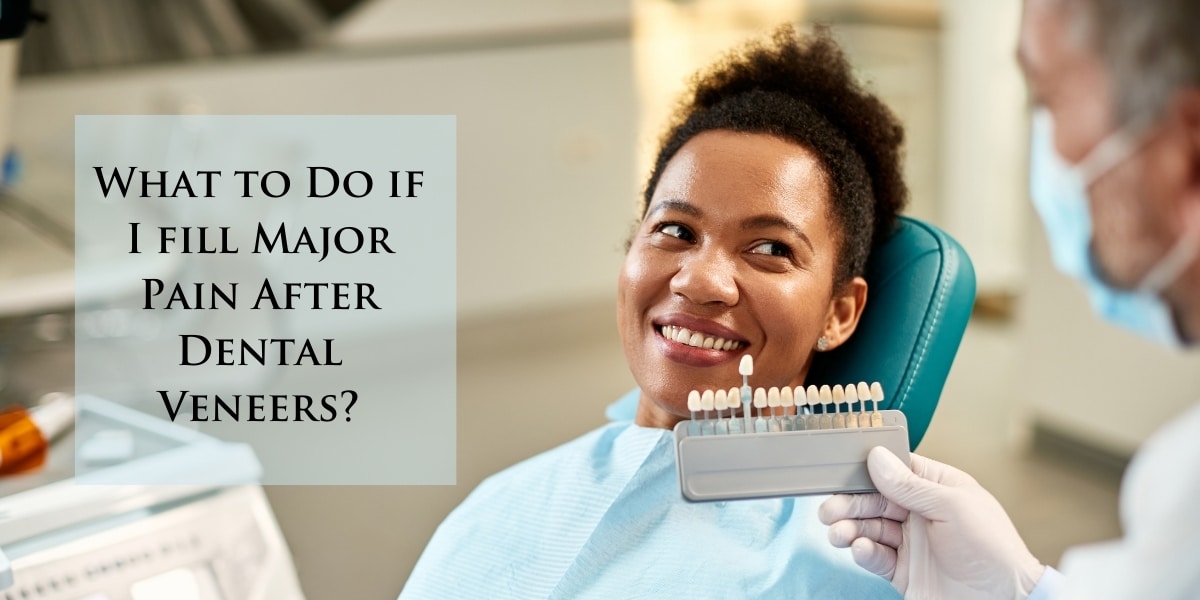Published on September 17, 2024

Dental veneers can transform your smile, but dealing with major pain after the procedure can be concerning. If you’ve recently gotten veneers and feel discomfort, you might wonder if it’s normal or if something’s wrong.
Rest assured, you’re not alone. While some sensitivity is common, prolonged pain should never be ignored.
Understanding the difference between typical recovery pain and signs of something more serious is key.
In this blog, we’ll walk through common causes of pain after veneers, when to worry, and how to find relief. Let’s explore what you can do to protect your smile and ease the discomfort!
Common Causes of Pain After Dental Veneers
Experiencing pain after getting dental veneers is not uncommon. However, understanding the underlying causes can help you determine whether it’s a temporary issue or something that needs further attention. The most frequent reasons for discomfort include tooth sensitivity, gum irritation, and issues with the fit of the veneers.
Here are some common causes of veneer pain:
- Tooth Sensitivity: Your teeth may become sensitive to hot and cold after the procedure, as the enamel is slightly shaved before applying veneers.
- Gum Irritation: Newly placed veneers may irritate your gums initially, leading to temporary discomfort as the tissues heal.
- Incorrect Fitting or Bonding: If veneers are not properly bonded or fitted, they can cause pressure on the teeth or gums, leading to discomfort or pain.
- Temporary vs. Prolonged Pain: Temporary discomfort should subside within a few days. However, if the pain persists, it could indicate a larger issue, like improper bonding or damage to the tooth underneath.
When Pain is Normal: What to Expect During Recovery?
Some pain and discomfort after getting veneers is completely normal. Knowing what to expect during the recovery phase can ease your concerns and help you differentiate between typical recovery symptoms and potential complications.
Here’s what you can typically expect:
- Mild Sensitivity: You might experience sensitivity to hot and cold for a few days after the veneers are placed. This usually subsides within a week.
- Discomfort in the Gums: Gum tissues may feel irritated or tender as they adjust to the new veneers. This discomfort should lessen as your gums heal.
- Adjustment Period: It takes time to get used to the feel of veneers, which can cause minor discomfort in the early days.
- Duration of Mild Pain: Mild pain or sensitivity typically lasts a few days to a week. If the pain continues beyond that, consult your dentist.
When to Seek Help for Veneer Pain?
Pain should not be ignored if it persists or worsens after the initial recovery period. In some cases, veneer pain could indicate a more serious issue, such as infection or nerve damage. Understanding when to seek help can prevent complications.
Warning signs to look out for:
- Throbbing Pain: Continuous or severe throbbing could be a sign of nerve involvement or infection.
- Swelling: Significant swelling around the gums or face may indicate an infection that needs immediate attention.
- Prolonged Sensitivity: Sensitivity that lasts more than a week, or sensitivity that worsens, could indicate an issue with the veneer fit or bonding.
- Consult Your Dentist: Always consult your dentist if you experience ongoing pain, as early intervention can prevent further damage or complications.
Home Remedies and Pain Relief Tips
For those experiencing mild pain after getting veneers, several at-home remedies can offer relief. While these tips may not solve larger issues, they can help you manage discomfort during the recovery period.
Some effective home remedies and tips include:
- Over-the-Counter Pain Relief: Medications like ibuprofen or acetaminophen can help reduce discomfort and inflammation.
- Gentle Oral Care: Brush with a soft-bristled toothbrush and use toothpaste for sensitive teeth to minimize irritation.
- Rinse with Saltwater: Rinsing your mouth with warm salt water can help soothe irritated gums and reduce inflammation.
- Diet Adjustments: Avoid extremely hot or cold foods, as well as hard or chewy items that might aggravate your teeth and gums.
- Stay Hydrated: Drinking plenty of water helps wash away food particles and keeps your mouth moist, reducing sensitivity.
Can Veneers Be Adjusted or Replaced?
If pain persists after the initial recovery period, it may be due to an issue with the fit or placement of the veneers. In some cases, adjustments or replacements may be necessary to alleviate discomfort and ensure a proper fit.
Here’s what you can expect:
- Adjusting Veneers: Dentists can often adjust the fit of the veneers if they are causing discomfort due to pressure or alignment issues. This is a simple and quick fix in most cases.
- Veneer Replacement: If the veneer is damaged, cracked, or improperly bonded, replacement may be necessary to relieve pain and restore functionality.
- Follow-Up Visits: Routine follow-up visits after getting veneers are crucial for monitoring the fit and addressing any discomfort. Your dentist can check for potential issues and make adjustments as needed.
Experiencing pain after getting veneers doesn’t always mean something is wrong. However, knowing the difference between normal discomfort and a serious issue can make a big difference in your recovery. Always pay attention to your body, and never hesitate to seek professional advice if needed. Proper care and timely action will ensure your veneers feel and look perfect.
